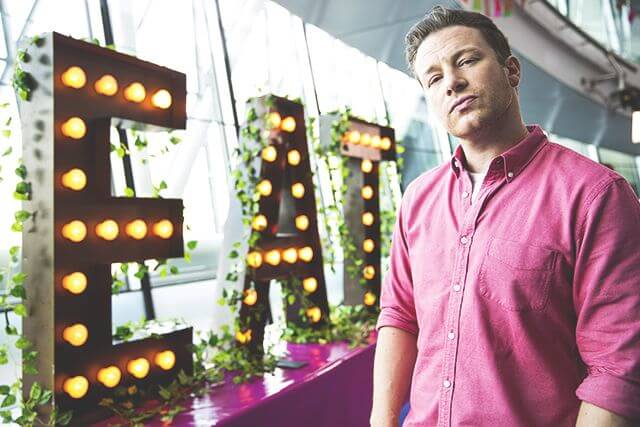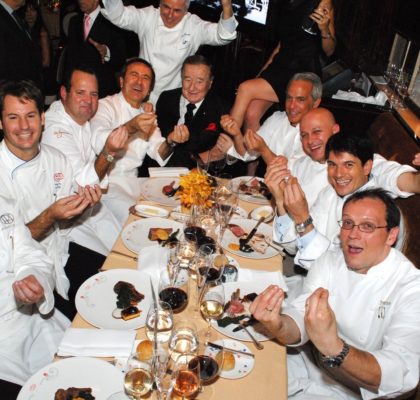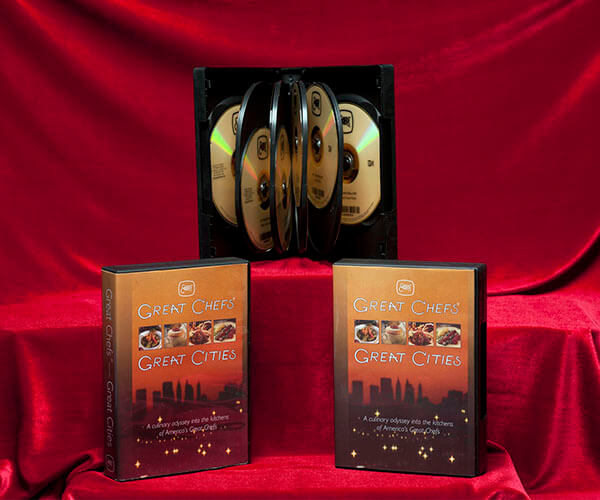Shut Up and Cook: Should Socially Conscious Chefs Just Get Back in the Kitchen?
Via Yahoo.com
Sure, it can seem a little rich (pun intended) when a five-star chef starts pontificating about the superiority of locally grown food, the moral imperative of forging a deeper connection to what we eat, and the poetry inherent in a plate of diminutive heirloom beets for which said chef has the privilege of charging $15 or more. But does that mean these chefs should just shut their mouths and stay in the kitchen?
It’s a question that might seem moot today, five years after Jamie Oliver stormed U.S. airwaves with his Food Revolution; three years since a gaggle of world-renowned chefs ranging from Ferran Adrià to Gastón Acurio to Dan Barber penned their “Open Letter to the Chefs of Tomorrow,” in which they “dream[ed] of a future in which the chef is socially engaged, conscious of and responsible for his or her contribution to a just and sustainable society”; and at a time when hardly a day passes without news of some chef, somewhere, stepping up to start a public school vegetable garden or sounding off about unsustainable fishing or establishing a foundation to support local farming. (Today it’s Rene Redzepi, writing about delicious bugs and global hunger in Time.)
And then there’s Sam Kass, who went from being the personal chef in Chicago for the family of a freshman Senator all the way to the White House. Not only does Kass cook for the Obamas five nights a week and oversee the White House’s famed kitchen garden, but he’s a full-fledged policy advisor on the frontline of the tooth-and-nail fight to preserve the administration’s hard-won standards for healthier school food.
With chefs giving TED talks and popping up at the World Economic Forum, it’s hardly surprising that the Copenhagen-based MAD—“a community of chefs, cooks and farmers with an appetite for knowledge”—would be able to find someone to argue that chefs becoming more socially engaged is a good thing. What’s more interesting is that they were able to find a writer to take the opposite stand.
The easy job goes to Eric Schlosser, whose Fast Food Nation probably did more to raise the public consciousness about the consequences of industrial agriculture than any other work out there. And because he doesn’t need to do much heavy lifting to make his case, his piece feels a bit phoned in.
“Some people think that chefs shouldn’t speak out on social issues, that they shouldn’t get involved in political causes or try to change our current industrial food system,” Schlosser writes. “Well, everyone’s entitled to his or her opinion. But I think that argument is ridiculous.”
He goes on to ask, “If the people who prepare food every day for a living aren’t qualified to pass judgment on that system, who is?” And then he extols the work of Alice Waters, to be sure the grande dame of socially engaged chefs—but really, we’ve heard all of this before.
It’s the rhetorical gymnastics engaged in by Jay Rayner—the restaurant critic for the U.K.Observer, who is tasked with articulating the opposing view—that are far more fun to watch.
“In recent years, a bizarre, albeit well intentioned, movement has sprung up,” he writes. “It portrays the high-end chef not merely as someone who knocks up a bit of dinner for rich people, but as an agent of social change; as someone who can make a cultural, political, and environmental difference.”
Rayner concedes that “the impulse to be involved in making the world a better place is a good one.”
“Only the most self-absorbed of us has no involvement whatsoever in community action of some sort, and chefs are people, too,” he writes. His quibble, he says, is with “the belief that there is something specific about cooking in luxury kitchens, in taking massively extravagant ingredients and processing them into finely honed dishes for people with big bank balances, that provides a unique skill set with a wider application.”
“The reality is that in the battle to feed the coming nine billion, a good recipe for coq au vin is of no use at all,” Rayner writes.
But that becomes a bit like arguing that because the sort of chefs whose Michelin-starred eateries tend to cater to a clientele that Rayner describes as “wretched, sneering, status-obsessed, gold-card-carrying narcissists, with scant interest in the food on the table before them” can’t solve all the world’s myriad food-related problems, they shouldn’t attempt to contribute to the solutions to any of them.
Schlosser, for his part, says as much: “In the world’s most privileged countries, there’s this notion that somehow you have to be perfect and pure, you have to devote your life entirely to helping the poor, or it’s not worth doing anything at all.”
But beyond whatever impact any given chef can have in addressing the environmental havoc wreaked by industrial-scale agriculture or the public health consequences of too much processed junk, it may arguably be their passion for food—for good, quality, sustainably grown ingredients capable of producing a sort of rapture on the tongue—that is their most worthy contribution to the public psyche vis-à-vis what we eat.
Yes, as Rayner points out, the cultlike emphasis on, say, “local” can be misguided (the lion’s share of the environmental impact of food is associated with how it’s produced, not how far it’s shipped), but I can’t help thinking that having a chorus of voices out there reminding us what it really means for food to be “wholesome,” “fresh,” and “natural” in defiance of big food’s Orwellian use of such terms as mere labels is only a good thing.










